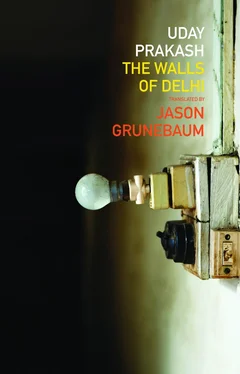That day, doctor Parvathi Nambiar of the Neurology Department at Jaipur Golden Hospital called Chandrakant and Shobha in private and told them with visible distress that Suri’s continued survival had been a miracle of miracles, but that he could go at any moment, there was no telling. As far as she was concerned, his time was already up. Somehow, to them, this was the final word from a medical perspective about Suri.
The two were devastated. They avoided looking at one another, knowing that they wouldn’t be able to endure the pain on the other’s face. A kind of inner weeping inside them both kept them on edge. That night, the two of them sat at home in the half flat and spoke in such hushed whispers that it would have been nearly impossible for someone to listen in. Suddenly something in the corner of the room caught Shobha’s eye. They had already turned off the light, and the room was dark except for a faint light from outside that cast diffuse light in the corner. She saw little Suri, sitting quietly leaning against the wall, watching them with stony, worried eyes that twinkled and flamed like little red marbles in the dark.
Shobha and Chandrakant believed that little Suri had both heard and understood everything they said.
His eyes peered at them from that dim corner of the room as if he had just been run over by a truck on the road, watching the living passersby as he lay dying: a last, lonely look. At that moment their son Suri’s eyes had the cold, blank, hard stare of a corpse that had emerged from a sunken ship at the bottom of the ocean, and was suddenly standing on the beach, in the sun, gazing at the living.
Once I asked a doctor I knew if he had heard of this mysterious ‘mangosil’ disease. He said he’d never heard of it. Yes, there was a disease called ‘meningocele,’ but that had more to do with the spinal cord and lower back. It can cause hydrocephalus where the head can’t drain the spinal fluid, and some swelling can occur. But there’s a cure, and it’s not fatal. The doctor continued, ‘I can’t find a disease with the symptoms you’re describing in any of the medical literature. If a disease like that had been detected, it definitely would have been described in the literature — like when AIDS was first found in humans.’ A DEATH DEFERRED, LIFE IN THE HALF FLAT
Three years passed and more. Suri continued to live, putting paid to the predictions and prognostications of the doctors. Not only that, he grew more intelligent, focused, remarkable, and healthier than before. He even began to speak, with a lisp, and picked things up very quickly. He asked his mother about the letters he saw printed in books or on newspapers, and then tried copying them down with whatever paper was at hand. He tried to sketch whatever caught his eye: a bike, Shobha, a cat, dog, radio, fan, bus, cars, motorcycle, TV, tree, house — anything and everything.
Another development occurred during this time in the form of a twenty-one inch black and white Beltek TV that sat on a wooden board fastened with nails to the front wall. It had a remote, which, for the most part, remained in the hands of none other than the misshapen three-and-a-half year old with the big head and little body. Chandrakant’s boss, Gulshan Arora, had given him the TV set for free after he had bought himself a colour Onida in the meantime. Chandrakant got a cable hookup for the cheap price of sixty rupees, and then the TV had loads of channels.
Suri, three years and a few months old, sat for hours watching the TV, leaning against the wall, his massive, heavy head supported by his feeble shoulders, remote in hand. Shobha also liked watching some of the soap operas and channels that played Hindi film music. She finished her work and plopped down and was taken off guard in the beginning when Suri turned on the TV with the remote to exactly the channel she wanted to watch. The grey matter inside his malformed, diseased, ill-proportioned head was developed far beyond that of a typical three-year-old. He was able to read his mother’s mind: all her wishes, all her thoughts. Like a spy he would look into the minds of those before him, and immediately know all their thoughts. Is this really the symptom of a disease, and one that the doctors say is incurable and puts Suri’s life in danger?
Or is it something else entirely?
Chandrakant called me again one day. He told me that the night before he and Shobha had awoken with a start and found Suri wasn’t in bed with them. He was in the corner against the wall watching TV at a very low volume — so low that it hadn’t disturbed their sleep. It must have been after one in the morning. Chandrakant said what was unusual was that he wasn’t watching cartoons or music videos, but had the news on. And that night, the reports of the nuclear tests at Pokhran were just coming in. He sat transfixed, his heavy, odd head sitting atop his little, weak body, as motionless as a statue of iron or stone. His twinkling red eyes were glued to the TV.
Chandrakant said that he felt fearful, and all sorts of notions about Suri popped up in his head. He was much older than his biological age. He was an oddity, this impossibly strange child. He knew things and kept thinking about things that we couldn’t even guess. He couldn’t be distracted like other kids with birds, toys, candy, kitty cats.
A few more months passed without my seeing Chandrakant or getting a call from him. I was getting tangled up with my own problems and stresses during that time. But then, out of the blue, he called at around three in the afternoon. His voice trembled with excitement.
Shobha had given birth to another baby boy. Normal, nothing out of the ordinary, healthy. Even though she was fifty Shobha didn’t have any trouble in labor. The delivery was without incident. Chandrakant couldn’t believe it when he was sitting outside in the waiting room and the nurse told him the news and asked for baksheesh. Maybe Auliya or Balaji had heard their prayers.
He then choked up a little bit. ‘We decided a name right away. Amar — Amarkant. The invincible. Shobha is out of her mind with joy. Suri hasn’t left his side for a second. You absolutely have to come and see the baby. Shobha’s dying to see you. The day after Amar was born Gulshan Arora gave me fifty thousand to set aside for buying our own place, and I’ve talked to a bank about getting two hundred thousand as a loan. Maybe by next month we’ll be able to move to the Janta Flats in Ashok Vihar.
I was stunned by this miracle of nature. By now Shobha was pushing fifty. Kids? At her age? Chandrakant kept talking over the phone. ‘We won’t be able to relax until you’ve come. Shobha insists and insists. Remember the first time we met and I was singing those abhang songs? Vithal had sent you, and everything changed once you came into our lives. Suryakant was also born after we met. I must have done terrible things in my last life that he’s paying the price to free me from. Shobha says that if you don’t come, Amarkant won’t turn out right, either. So get here as soon as you can!’
Those were my toughest days, as tough as writers’ lives often are. Days filled with panic, a feeling that everything was slipping away; nothing was stable, only stress after stress. I had no work at all, nothing saved for the future, no pension. Delhi was changing at an unbelievable pace. Every day new products would appear everywhere that no one could have ever dreamed of. The twentieth century had passed, and the new one was before us. And the dawns of the new one were unlike the dawns before. Only recently one of the greatest Hindi writers died in the Sharda mental hospital, mad and broke. A poet disappeared from home without a trace, and another had taken his own life. There was no place left for writers like me who wrote in this Hindi language. It was now an age of riches, power, violence, criminality, and looting, and it wasn’t any less frightening than the worst nightmare you could imagine. Labour had no more value, and capital was no longer tied to labour — it was now totally free, untethered. My life was reduced to the struggle of how to get by. People like Chandrakant and me were more-or-less given a swift kick in the pants by society, who had no use for them under current circumstances.
Читать дальше










